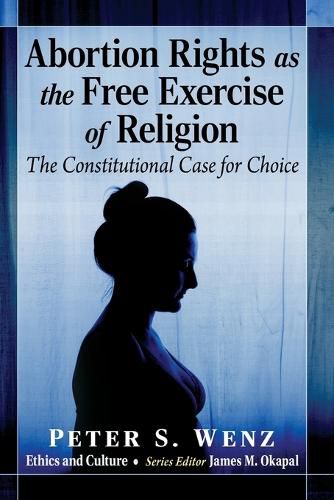Readings Newsletter
Become a Readings Member to make your shopping experience even easier.
Sign in or sign up for free!
You’re not far away from qualifying for FREE standard shipping within Australia
You’ve qualified for FREE standard shipping within Australia
The cart is loading…






This title is printed to order. This book may have been self-published. If so, we cannot guarantee the quality of the content. In the main most books will have gone through the editing process however some may not. We therefore suggest that you be aware of this before ordering this book. If in doubt check either the author or publisher’s details as we are unable to accept any returns unless they are faulty. Please contact us if you have any questions.
This book is the first to analyze Supreme Court decisions related to religious freedom and abortion rights, showing that the Court gives women a religious right to abortions, at least during the first half of pregnancy. The Court considers any sincerely claimed religious belief to be worthy of accommodation if it causes no great harm. Therefore, a woman who claims that having a child would interfere with work dedicated to God's glory should receive an accommodation that exempts her from state laws restricting abortion, as that is the kind of relief accorded by the Court to others seeking religious exemptions from generally applicable laws and other rules.
The Court cannot claim in this case that abortion causes great harm, because it maintains even in its most recent abortion decision that it is neutral on the question of when the unborn attains a right to life, and loss of the unborn's life is the central harm claimed by others regarding abortion. The book argues that 21 weeks of gestation is the earliest point at which a right to life can be attributed to the fetus on a scientific basis.
$9.00 standard shipping within Australia
FREE standard shipping within Australia for orders over $100.00
Express & International shipping calculated at checkout
Stock availability can be subject to change without notice. We recommend calling the shop or contacting our online team to check availability of low stock items. Please see our Shopping Online page for more details.
This title is printed to order. This book may have been self-published. If so, we cannot guarantee the quality of the content. In the main most books will have gone through the editing process however some may not. We therefore suggest that you be aware of this before ordering this book. If in doubt check either the author or publisher’s details as we are unable to accept any returns unless they are faulty. Please contact us if you have any questions.
This book is the first to analyze Supreme Court decisions related to religious freedom and abortion rights, showing that the Court gives women a religious right to abortions, at least during the first half of pregnancy. The Court considers any sincerely claimed religious belief to be worthy of accommodation if it causes no great harm. Therefore, a woman who claims that having a child would interfere with work dedicated to God's glory should receive an accommodation that exempts her from state laws restricting abortion, as that is the kind of relief accorded by the Court to others seeking religious exemptions from generally applicable laws and other rules.
The Court cannot claim in this case that abortion causes great harm, because it maintains even in its most recent abortion decision that it is neutral on the question of when the unborn attains a right to life, and loss of the unborn's life is the central harm claimed by others regarding abortion. The book argues that 21 weeks of gestation is the earliest point at which a right to life can be attributed to the fetus on a scientific basis.